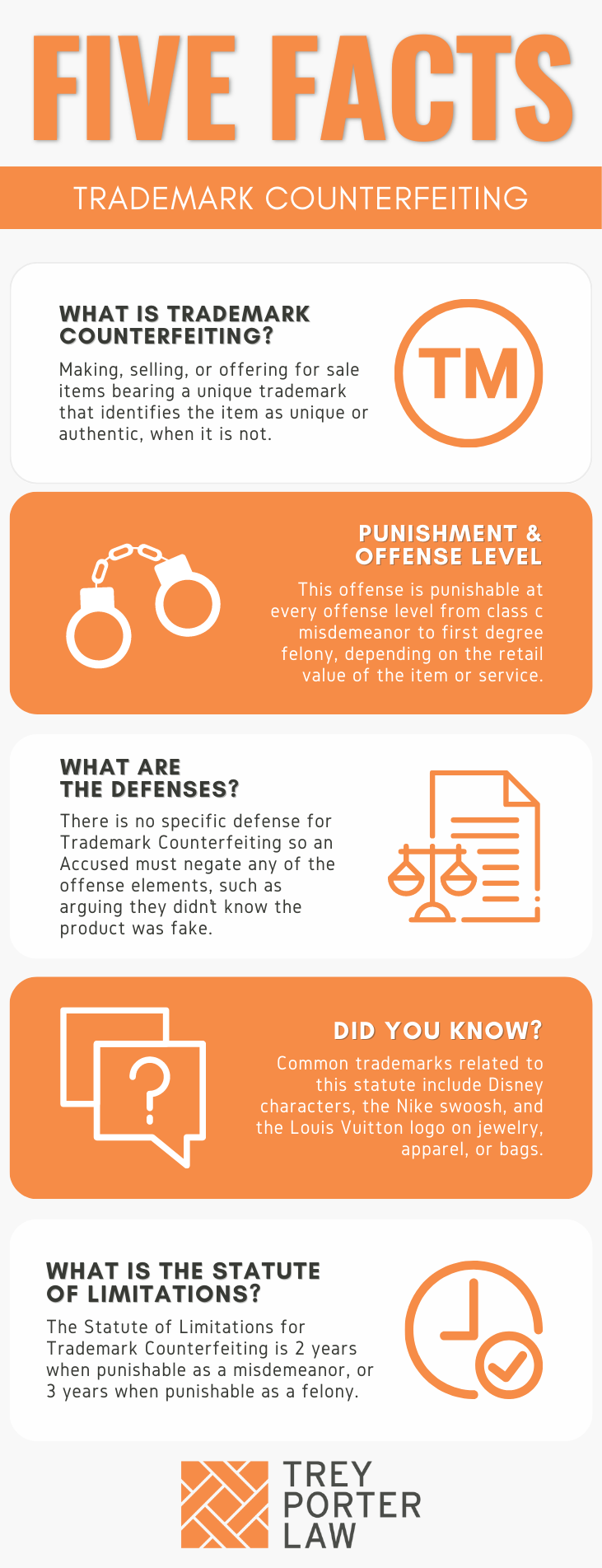WHAT IS TRADEMARK COUNTERFEITING IN TEXAS?
In Texas, a person commits trademark counterfeiting by manufacturing, selling, or advertising the sale of goods or services bearing a unique symbol identifying the good or service as authentic, when in fact it is not.
WHAT IS THE TRADEMARK COUNTERFEITING LAW IN TEXAS?
Tex. Penal Code § 32.23. TRADEMARK COUNTERFEITING.
(b) A person commits an offense if the person intentionally manufactures, displays, advertises, distributes, offers for sale, sells, or possesses with intent to sell or distribute a counterfeit mark or an item or service that:
(1) bears or is identified by a counterfeit mark; or
(2) the person knows or should have known bears or is identified by a counterfeit mark.
(c) A state or federal certificate of registration of intellectual property is prima facie evidence of the facts stated in the certificate.
(d) For the purposes of Subsection (e), when items or services are the subject of counterfeiting in violation of this section pursuant to one scheme or continuing course of conduct, the conduct may be considered as one offense and the retail value of the items or services aggregated in determining the grade of offense.
(e) An offense under this section is a:
(1) Class C misdemeanor if the retail value of the item or service is less than $100;
(2) Class B misdemeanor if the retail value of the item or service is $100 or more but less than $750;
(3) Class A misdemeanor if the retail value of the item or service is $750 or more but less than $2,500;
(4) state jail felony if the retail value of the item or service is $2,500 or more but less than $30,000;
(5) felony of the third degree if the retail value of the item or service is $30,000 or more but less than $150,000;
(6) felony of the second degree if the retail value of the item or service is $150,000 or more but less than $300,000; or
(7) felony of the first degree if the retail value of the item or service is $300,000 or more.
WHAT IS THE PENALTY CLASS FOR TRADEMARK COUNTERFEITING IN TEXAS?
The penalty classification for trademark counterfeiting depends on the retail value of the item or service. If the value is:
- Less than $100:
- Class C misdemeanor, punishable by up to a $500 fine, and no jail time;
- $100 to $749:
- Class B misdemeanor, punishable by up to 180 days in county jail;
- $750 to $2499:
- Class A misdemeanor, punishable by up to one year in county jail;
- $2500 to $29,999:
- State jail felony, punishable by 180 days to two years in a state jail facility;
- $30,000 to $149,000:
- Third degree felony, punishable by two to ten years in prison;
- $150,000 to $299,999:
- Second degree felony, punishable by two to 20 years in prison;
- $300,000 or more:
- First degree felony, punishable by five to 99 years or life in prison.
WHAT IS THE PUNISHMENT RANGE FOR TRADEMARK COUNTERFEITING IN TEXAS?
The punishment range for trademark counterfeiting increases with the retail value of the item or service:
- Class C misdemeanor, if the retail value is less than $100:
- maximum fine of $5,000, no jail time;
- Class B misdemeanor, if the retail value is $100 or more but less than $750:
- up to 180 days in jail, maximum fine of $2,000;
- Class A misdemeanor, if the retail value is $750 or more but less than $2,500:
- up to one year in jail, maximum fine of $4,000;
- State jail felony, if the retail value is $2,500 or more but less than $30,000:
- 180 days to two years in a state jail facility, maximum fine of $10,000;
- Third degree felony, if the retail value is $30,000 or more but less than $150,000:
- two to ten years in prison, maximum fine of $10,000;
- Second degree felony, if the retail value is $150,000 or more but less than $300,000:
- two to 20 years in prison, maximum fine of $10,000;
- First degree felony, if the retail value is $300,000 or more:
- five to 99 years or life in prison, maximum fine of $10,000.
WHAT ARE THE PENALTIES FOR TRADEMARK COUNTERFEITING IN TEXAS?
A person charged with trademark counterfeiting may be eligible for probation after a conviction, or deferred adjudication without a conviction.
- What is the length of probation for trademark counterfeiting? If a person is convicted of a Class C misdemeanor, the only punishment is a maximum fine of $500. But a person may be placed on probation for up to two years if convicted of a Class A or Class B misdemeanor. For state jail and third degree felony trademark counterfeiting charges, the probation term may range from two to five years, and may not exceed ten years for second degree and first degree felonies.
- What is the length of deferred adjudication for trademark counterfeiting? To avoid a trademark counterfeiting conviction, a person may plead guilty or nolo contendere (“no contest”) to a judge, and be placed on deferred adjudication. The period of deferred adjudication may not exceed 180 days for a Class C misdemeanor, or two years for a Class A or Class B misdemeanor. The deferred adjudication term for a state jail felony is between two and five years, with the possibility of extending it up to ten years. The deferred adjudication term may not exceed ten years for first degree, second degree, and third degree felonies.
WHAT ARE THE DEFENSES TO TRADEMARK COUNTERFEITING IN TEXAS?
The statute does not authorize specific defenses to trademark counterfeiting. A person accused thereof may assert any defense in an attempt to negate at least one of the elements the State must prove at trial. For example, an accused may argue he or she lacked the requisite knowledge or intent to commit the offense.
WHAT IS THE STATUTE OF LIMITATIONS FOR TRADEMARK COUNTERFEITING IN TEXAS?
The limitation period for trademark counterfeiting classified as a misdemeanor is two years. If categorized as a felony, trademark counterfeiting has a three-year limitation period.
TRADEMARK COUNTERFEITING IN TEXAS
Trademark counterfeiting is illegally manufacturing, advertising, or selling goods or services bearing a forged symbol of authenticity, when the product is not as represented–i.e., a knock-off.
TEXAS TRADEMARK COUNTERFEITING COURT CASES
The case law regarding trademark counterfeiting in Texas demonstrates how courts analyze the circumstantial evidence showing a person’s intent to commit the offense.
In Nazemi v. State, the defendant and his wife sold jewelry in their retail shop. Undercover officers purchased jewelry with counterfeit Disney charms, Warner Bros. characters, and the Nike “swoosh” symbol, all of which were trademarked. The defendant denied knowledge of the counterfeit goods, but was convicted. The appellate court affirmed, noting that the defendant was knowledgeable and sophisticated in retail matters, owned other businesses, and had a bachelor’s degree in physics. Under the circumstances, the jury could have reasonably concluded the defendant knew the trademarked symbols were counterfeit. 28 S.W.3d 806 (Tex. App.—Corpus Christi-Edinburg 2000, no pet.).













